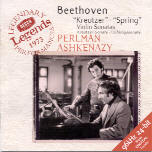These ageless performances have been wonderfully remastered using 24-bit technology, which gives even more clarity, depth, and detail to the already excellent 1973-74 recordings. Itzhak Perlman’s spontaneity and tonal beauty are equally matched by his rhythmic alacrity and amazing care for nuance. Vladimir Ashkenazy’s flexible and precise piano creates the perfect frame for such a jewel. Violin and piano totally fuse with each other, transforming themselves into another ideal instrument–perhaps not as openly dramatic and conflicting as Beethoven may have wished (listen to Kremer and Argerich, exact opposites of Perlman/Ashkenazy), but one of supreme homogeneity and sense of respiration. As a result, the “Kreutzer” Sonata shows a less monumental, more open and human face than usual, while the “Spring” rarely has justified its title so completely. With these performances, Perlman and Ashkenazy became an instant classic duet, the peer of legends such as Heifetz/Moiseiwitsch, Szigeti/Bartók, Huberman/Friedman, and Grumiaux/Haskil. Priceless–especially at mid-price.
































